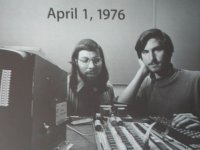Ownership and Agency Will Propel STEM Learning
Your content has been saved!
Go to My Saved Content.As part of the Marin Speaker Series in San Rafael, California, legendary Apple co-founder Steve Wozniak was asked what advice he would give a middle school math student. His answer: learn programming and get off the page in the textbook, don't let school hold you back, and learn at your own pace with tools like Khan Academy. In other words, break free from the linear path of math instruction that starts with pre-algebra and culminates with calculus, as The New York Times Editorial Board highlights in its piece "Who Says Math Has To Be Boring?"
Ownership of Outcomes
Wozniak's words could not be more timely as the United States grapples with yet another round of mediocre test scores in math and science on the Program for International Student Assessment (PISA).
When it comes to STEM, schools are running into the adage from Mark Twain: "Don't let your schooling interfere with your education." Kids are learning many STEM skills, but it's not happening in schools.
Wozniak experienced inspiration from his high school electronics teacher, who provided foundational instruction that set him on a path of self-directed learning which would revolutionize personal computing. And Wozniak spent every free minute outside of his day job at Hewlett Packard building the boards that became the Apple II.
Today, kids are glued to Halo and Call of Duty, and when they are not playing these games, they are watching YouTube videos on how to play the game better. If they attend schools with 1:1 programs, these same students are devising ways to skirt restrictions on school-issued tablets, not necessarily to be nefarious, but for the challenge of it. In the same way that leveling up in Call of Duty earns respect from peers, so does the clever hack for finding a way to get past school restrictions.
What the PISA found, according to its manager Andreas Schleicher and as reported by Thomas Friedman in The New York Times, is
That's the rub with technology in schools. Students can grow frustrated by not feeling ownership over their learning, and can get trapped in a power struggle with teachers over choice and direction with learning.
The work coming out of the private sector can be useful in helping schools to think about the issue of ownership for students. The Times quoted Andrew McAfee, co-founder of the Initiative on the Digital Economy at the M.I.T. Sloan School of Management:
Self-Motivation and Student Agency
What is the implication for schools and teachers? The single entity and mode of delivery may need rethinking to account for the wealth of access to information now in place with the Internet and mobile technology. The single entity of the teacher needs to be reconsidered and recalibrated.
Sugata Mitra has popularized this notion with his "hole in the wall" experiment, which illustrated that kids with Internet access can construct learning environments, pursue passion and contribute meaning -- in other words, "kids can teach themselves."
The learning paradigm is shifting toward student "agency."
Chris Kennedy, the Superintendent of Schools in West Vancouver, British Columbia explains:
Steve Wozniak had agency, and carried it through to revolutionary levels. There are more Steve Wozniaks out there. Let's not make it so difficult or impose unnecessary hurdles for future change makers.
